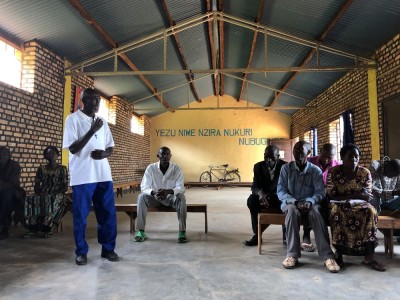Who told you your suffering is meaningless?

Suffering is real. As we anticipate the end of life on earth, suffering is inevitable. I have walked with those who have experienced every possible kind of suffering. But it wasn’t until 2009 and my first medical mission trip that I came to understand atrocious suffering may ultimately lead to good.
Incessant suffering may lead to fulfilling a God-given purpose. End-of-life suffering may result in families and communities ushering the dying person home with worship, praise, and confidence. Perhaps that’s a miracle of another kind.
Going to Rwanda through the years and sharing my family’s life with our Rwandan families has changed my perspective on every aspect of life. They’ve impacted my spiritual life, family life, and professional life in medicine. Therefore, I’d like to share three stories from Rwanda that may also comfort your unique suffering as you prepare for the end of life.
On April 6, 1994, a plane carrying the Rwandan President, a Hutu, was shot down which led to horrific violence. Extremist groups dehumanized Tutsis with extensive brutalities — including rape, torture and mass killings.
My understanding of how good can be birthed from the unimaginable began when I spent time with a genocide survivor. His name was Blessed.
When I first met Blessed, I noticed the scar above his left eyebrow — a reminder of the violence he survived. I simply said, “I love your name.” In a place where so much pain, horror, and inhumanity took place, names like Blessed, Promise, Peace, and Grace are a sign of hope and healing.
Blessed, like so many others, had a story to share. We walked together with the country’s stunning beauty stretched out before us, and he began talking to me. “I love my country, and I love my president,” he said. “I am blessed to live here, and mostly I am blessed that I am alive.”
“I love your nation too,” I replied. “And I’m also grateful to have so many friends here. This is a place of blessing, and you are Blessed.”
He smiled and explained, “My auntie gave me that name when I survived the attack. At first, they thought I was dead. My parents did not survive the genocide. Only my sister and I did.”
Joyfully, he continued, “I am an uncle now! My mother and father would be so happy to know this. My auntie laughs all the time that her daughter is just like my mother was as a young girl. Even though Queen is only four, she is always trying to be the mother to others.”
When I asked Blessed how he found joy, he answered, “You must begin with forgiveness. For me, there was no alternative.”
Patients who reach the end of their lives with fractured personal relationships intensely suffer the loss as time for reconciliation grows short. Peace sometimes carries a cost, which may involve the exchange of being right for being with. Avoidable suffering begins with tending to relational regrets.
Families and caregivers, if your loved one is experiencing restlessness, consider the possibility that he or she has an unmet need for reconciliation. Make every attempt to fulfill this need for peace.
Years after my conversation with Blessed, I was in Rwanda again for medical missions and had another conversation I’ll never forget. It was 5:30 a.m., and a fellow physician and I had decided to run the distance from our hospital in Kigali, Rwanda, to another hospital in a small community 15 miles away.
As we set out, a young man dressed in a sweatshirt and long pants was running the same direction as we departed the hospital. The man introduced himself as Pacifique.
While we ran together, Pacifique shared his pain of losing a friend and a shared dream to build farming co-ops. “I thought if I couldn’t have our dream, at least I could have our run,” he said, grieving both his friend and their vision.
In that moment, it became apparent to me that it was orchestrated by God. I needed to encourage my new friend with my own story about dreaming dreams and seeing them realized.
I told Pacifique about the Dream Medical Center, founded on the belief that everyone deserves a chance to dream. It began as a place of faith, hope, and love, serving widows, orphans and the poor.
I shared how I had to come to his country from halfway around the world to realize my dreams. The big hospital behind us was once only a small dream — the vision for a small medical clinic intended to serve the poor of Rwanda. That dream had been planted in my heart and in the heart of another doctor a decade earlier, after we had spent a week in the area caring for the poor.
We discovered that Dr. Charles had been dreaming about adding a medical clinic to the Dream Center, and our hearts caught fire. A small dream became a big, reckless dream — the kind of dream that is bound not by the possible but the limitless, because it was a God-placed dream. I shared my experience in my Christian walk that when God asks me to do a big thing, He reveals His presence by the people He brings to the journey.
I shared with Pacifique that the Dream Medical Center is now considered one of the best in Rwanda. I encouraged him with the truth that our God-sized dreams came to pass despite our weaknesses. And that his dreams did not have to end just because he now dreams alone. God would bring people to help him fulfill the dream.
I must have been out of breath by that point because our run continued for a few moments in silence. Finally, he said, “Thank you for helping me to see my dream again. It is also a reckless dream. I like that.” A few moments later he added, “My friend that I ran with, he was my younger brother.”
Why do I share this with you as you confront your own suffering? Because the suffering of regret may be felt in unrealized potential and unmet dreams. Because it reminds me that God places goals and dreams in the hearts of His people. But He almost always uses more than one person to fulfill His plans. If part of your suffering is related to unfinished dreams, or unfulfilled purpose, take heart. Your interrupted life can carry on through the lives of your dream-bearers.
If you have breath, God will give you purpose. Perhaps your suffering is the platform for that purpose, allowing you to share wisdom and prevent others from experiencing the same regrets.
You may be in your life’s last quarter or even overtime, but you are still in the game or God would have called you home.
Remember that God sees and hears you in your suffering. Take courage and turn toward your dream — let yourself “see” it again — and ask God to show you your purpose as you run.
If you have breath, God will give you purpose.
Dr. Pamela Prince Pyle is a Board-Certified Internal Medicine physician who studied at Oklahoma State University, North Texas Health Science Center, and completed her training at Baylor University in Houston. She was one of three physicians selected in 1992 by Carolina Health Specialists (CHS) to begin the first hospital-based internal medicine practice outside of a university setting in the United States.




























